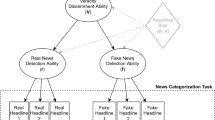Abstract
This research examines whether self-referencing and self-attention facilitate careful examination of a message, referred to as systematic processing. In Experiment 1, undergraduates (n=158) who were induced to be either high or low in self-referencing read either a strong or a weak two-sided article that discussed tuition increases. Contrary to predictions, low self-referencing participants agreed more with increasing tuition than high self-referencing participants. Participants who read strong versus weak arguments agreed more with increasing tuition. In Experiment 2 undergraduates (n=204) who were either high or low in self-attention and either high or low in self-referencing read either a strong or weak two-sided article that discussed tuition increases. Consistent with predictions, participants who were either high in self-attention or high in self-referencing were more persuaded by strong than weak arguments. Specifically, both high self-attention, low self-referencing participants and low self-attention, high self-referencing participants were significantly more persuaded by strong than weak arguments. There was a trend for high self-attention, high self-referencing participants to be more persuaded by strong than weak arguments. There were no argument quality effects for low self-attention low self-referencing participants. The results of these two studies suggest that both self-referencing and self-attention facilitate systematic processing.
Similar content being viewed by others
References
Burnkrant, R. E., & Unnava, H. R. (1989). Self-referencing: A new strategy for increasing processing of message content.Personality and Social Psychology Bulletin, 15, 628–638.
Carver, C. S. (1979). A cybernetic model of self-attention processes.Journal of Personality and Social Psychology, 37, 1251–1281.
Carver, C. S., & Scheier, M. F. (1978). Self-focusing effects of dispositional self-consciousness, mirror presence, and audience presence.Journal of Personality and Social Psychology, 36, 324–332.
Carver, C. S., & Scheier, M. F. (1981).Attention and self-regulation: A control theory approach to human behavior. New York: Springer-Verlag.
Chaiken, S., Liberman, A., & Eagly, A. H. (1989). Heuristic and systematic processing within and beyond the persuasion context. In J. S. Uleman and J. A. Buagh (Eds.),Unintended thoughts: Limits of awareness, intention, and control (pp. 212–252). NY: Guilford.
Duval, S., & Wicklund, R. A. (Eds.). (1972).A theory of objective self-awareness. New York: Academic Press.
Eagly, A. H., & Chaiken, S. (1993).The psychology of attitudes. New York: Harcourt Brace Jovanovich.
Froming, W. J., Walker, G. R., & Lopyman, K. J. (1982). Public and private self-awareness: When personal attitudes conflict with social expectations.Journal of Experimental Psychology, 18, 476–487.
Hutton, D. G., & Baumeister, R. F. (1992). Self-awareness and attitude change: Seeing oneself on the central route to persuasion.Personality and Social Psychology Bulletin, 18, 68–75.
Johnson, B. T., & Eagly, A. H. (1989). Effects of involvement on persuasion: A meta-analysis.Psychological Bulletin, 106, 290–314.
Johnson, B. T., Turco, R. M., & Levin, K. D. (1995). Effects of argument quality on persuasion: A meta-analysis. Unpublished manuscript.
Klein, S. B., & Loftus, J. (1988). The nature of self-referent encoding: The contributions of elaborative and organizational processes.Journal of Personality and Social Psychology, 55, 5–11.
Liberman, A., & Chaiken S. (1992). Defensive processing of personality relevant health messages.Personality and Social Psychology Bulletin, 18, 669–679.
Mullen, B. (1983). Operationalizing the effect of the group on the individuals: A self-attention perspective.Journal of Experimental Social Psychology, 19, 295–322.
Mullen B. (1987). Self-attention theory: The effect of group composition on the individual. In B. Mullen & G. R. Goethals (Eds.),Theories of group behavior (pp. 125–146). New York: Springer-Verlag.
Ostrom, T., & Brock, T. C. (1968). A cognitive model of attitudinal involvement. In R. P. Abelson, E. Aronson, W. J. McGuire, T. M. Newcomb, M. J. Rosenberg, & P. H. Tannebaum (Eds.),Theories of cognitive consistency: A sourcebook (pp. 373–383). Chicago: Rand-McNally.
Petty, R. E., & Cacioppo, J. T. (1981). Issue involvement as a moderator of the effects on attitude of advertisement content and context.Advances in Consumer Research, 8, 20–24. Ann Arbor, MI: Association for Consumer Research.
Petty, R. E., & Cacioppo, J. T. (1986).Communication and persuasion: Central and peripheral routes to attitude change. New York: Springer-Verlag.
Petty, R. E., Cacioppo, J. T., & Goldman, R. (1981). Personal involvement as a determinant of argument-based persuasion.Journal of Personality and Social Psychology, 41, 847–855.
Petty, R. E., Cacioppo, J. T., & Schumann, D. (1983). Central and peripheral routes to advertising effectiveness: The moderating role of involvement.Journal of Consumer Research, 10, 135–146.
Petty, R. E., Wells, G. L., & Brock, T. C. (1976). Distraction can enhance or reduce yielding to propaganda: Thought disruption versus effort justification.Journal of Personality and Social Psychology, 34, 874–884.
Scheier, M. F. (1976). Self-awareness, self-consciousness, and angry aggression.Journal of Personality, 44, 627–644.
Scheier, M. F., & Carver, C. S. (1977). Self-focused attention and the experience of emotion: Attraction, repulsion, elation, and depression.Journal of Personality and Social Psychology, 35, 624–636.
Scheier, M. F., & Carver, C. S. (1980). Private and public self-attention, resistance to change, and dissonance reduction.Journal of Personality and Social Psychology, 39, 390–405.
Turco, R. M., & Johnson, B. T. (1995). Effects of judgmental confidence on persuasion. Unpublished manuscript.
Author information
Authors and Affiliations
Rights and permissions
About this article
Cite this article
Turco, R.M. Self-referencing, quality of argument, and persuasion. Current Psychology 15, 258–276 (1996). https://doi.org/10.1007/BF02686883
Accepted:
Issue Date:
DOI: https://doi.org/10.1007/BF02686883




